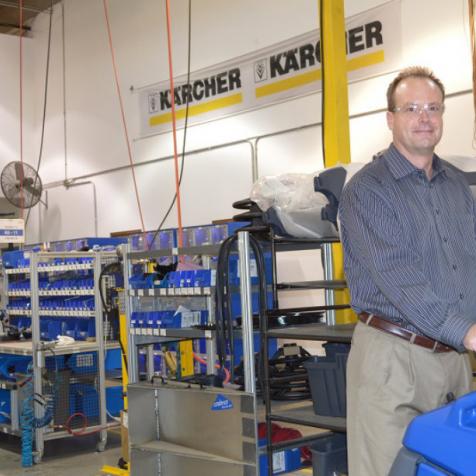
Company Details
Location
Englewood, Colorado
Founded
1948
Ownership Type
Private
Employees
450
Products
Pressure washing equipment
Englewood
www.karcher.com
Founded: 1948
Privately owned
Employees: 450 in Denver metro area; 1,200 in USA; 10,000 worldwide
Craig Rissler and colleagues at Karcher's Englewood plant care for an iconic industry brand well-known in Europe with more growth in store here
It is unlikely that back in 1935, Alfred Karcher knew he was planting the seeds for a $2.5 billion dollar company when he built his “Karcher Salt Bath Furnace.”
‘Today, Karcher is best known as a world leader in pressure washers for home and industry,” says Dan Spickard, vice president of operations. “We are also a diversified cleaning equipment company with factories throughout the world.”
Though there have been many iterations of the company, globally Karcher is now one of the top companies in the industrial, commercial and residential cleaning-equipment business. In Colorado, however, it is focused primarily on commercial floor care.
“We have been at this location since 1980 and occupy about 260,000 square feet here,” says Craig Rissler, plant manager of the Englewood facility.

Karcher provides cleaning systems, cleaning products and services for recreation, government offices, educational institutions, retail, hospitality, household, transportation, trade and industry. And business is booming.
“We are definitely still growing at this phase,” says Rissler. “Year-to-date we are at a 9% growth rate. We attribute that to product innovation, quality manufacturing and infrastructure support across the nation through our dealers.”
In addition to innovation, the business model has a customer-centric design that also helps to drive growth.
“We are all about innovation, quality, dependable products, and our service to the customer,” says Rissler. “What we do is we make to customer order and we build and ship product in three days.”
Karcher leverages technological advances throughout their product line in an effort to create products that are more robust, efficient and economical. “We were the first to market the stand-up piece of flooring equipment as opposed to a walk behind or a sit down,” says Rissler.
Several market drivers have steered Karcher toward its upward swing in business. “An unfortunate one that has driven some of our growth is natural disasters,” says Rissler, referring to recent flooding in Colorado and other areas. Karcher donates to the flood relief efforts through the Red Cross, as well as participates in cancer-awareness runs.
Schools have also been an effective market driver for the company. “Educational funding is coming back after years of soft revenues from the housing market decline and the tax revenues being pretty soft for the school districts,” says Spickard. “This year they have had to spend on their maintenance equipment.”
Keeping up with increasing demand also means maintaining a steady workforce.
“The average age of our assembler here in Englewood is 51 years old,” says Spickard. “Our average tenure of our employee is somewhere north of 12 years. We don’t really plan to replace the aging work force one for one directly. We are now investing in and investigating new technologies that will help us advance our manufacturing process to the point where we will require less labor, but it will require a different skillset.”

Spickard and Rissler see finding skilled labor a big problem for Colorado in general. “Many times I hear that the pipelines for technicians have to improve,” says Spickard. “Young kids think manufacturing is the three D’s, dull, dangerous and dirty. It is not like that anymore, and in the future it will be very high tech.”
Challenges: “There is seasonality to our business,” says Rissler. “The challenge is how to increase your capacities for short times during the year.”
Opportunities: “It is a growing company and we have opportunities to improve our operations through capital investments of new technologies,” says Rissler.”
Needs: “Our needs are to continue to find ways to increase our growth, and our capacities both physically and in the workforce,” says Spickard. “We have outgrown the Englewood space.”
